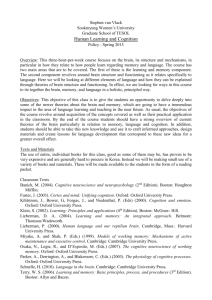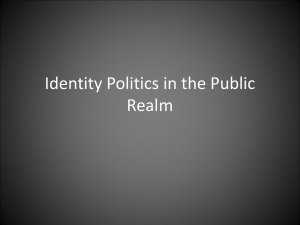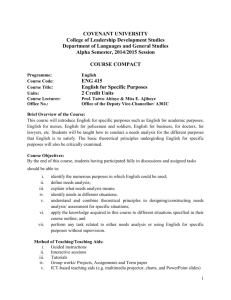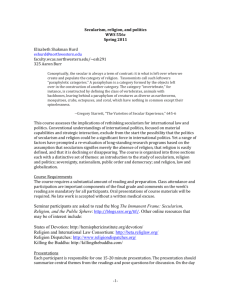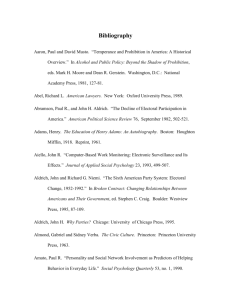Law, Religion & Global Politics
advertisement
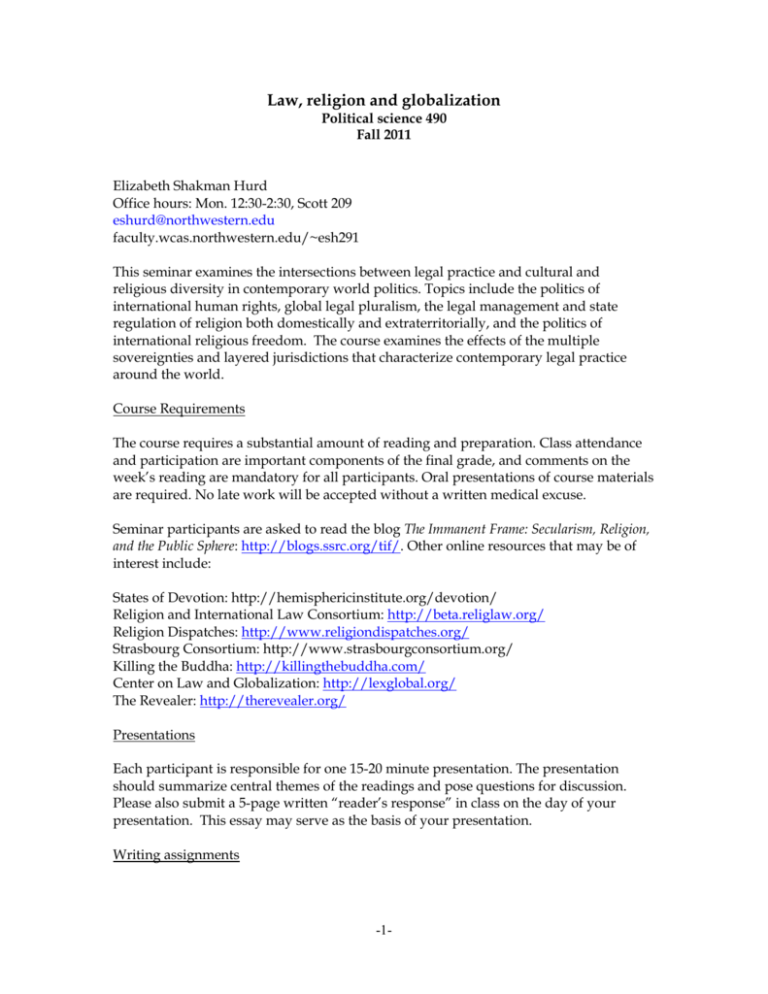
Law, religion and globalization Political science 490 Fall 2011 Elizabeth Shakman Hurd Office hours: Mon. 12:30-2:30, Scott 209 eshurd@northwestern.edu faculty.wcas.northwestern.edu/~esh291 This seminar examines the intersections between legal practice and cultural and religious diversity in contemporary world politics. Topics include the politics of international human rights, global legal pluralism, the legal management and state regulation of religion both domestically and extraterritorially, and the politics of international religious freedom. The course examines the effects of the multiple sovereignties and layered jurisdictions that characterize contemporary legal practice around the world. Course Requirements The course requires a substantial amount of reading and preparation. Class attendance and participation are important components of the final grade, and comments on the week’s reading are mandatory for all participants. Oral presentations of course materials are required. No late work will be accepted without a written medical excuse. Seminar participants are asked to read the blog The Immanent Frame: Secularism, Religion, and the Public Sphere: http://blogs.ssrc.org/tif/. Other online resources that may be of interest include: States of Devotion: http://hemisphericinstitute.org/devotion/ Religion and International Law Consortium: http://beta.religlaw.org/ Religion Dispatches: http://www.religiondispatches.org/ Strasbourg Consortium: http://www.strasbourgconsortium.org/ Killing the Buddha: http://killingthebuddha.com/ Center on Law and Globalization: http://lexglobal.org/ The Revealer: http://therevealer.org/ Presentations Each participant is responsible for one 15-20 minute presentation. The presentation should summarize central themes of the readings and pose questions for discussion. Please also submit a 5-page written “reader’s response” in class on the day of your presentation. This essay may serve as the basis of your presentation. Writing assignments -1- Seminar participants will submit two 5-page essays in response to course readings, one of which is due on the day of his or her presentation. The second may be submitted at any time during the quarter, also in response to the day’s assigned readings. A final paper (15-pgs.) applying insights from this course to your own developing research interests is due on the first day of finals week, Monday, December 5th. This should be a short but solid argument that could be turned into a dissertation chapter. Evaluation Final grades will be based upon 1) attendance and participation, including the presentation (25%); 2) 2 reader’s response essays (25%); and 4) final paper (50%). Required Texts The following texts are available for purchase at Beck’s, and are on 2-hour reserve at the library. Book chapters and articles are available electronically through Blackboard. Craig Calhoun, Mark Juergensmeyer and Jonathan VanAntwerpen, eds., 2011. Rethinking Secularism. Oxford: Oxford University Press. David M. Engel and Jaruwan S. Engel, 2010. Tort, Custom and Karma: Globalization and Legal Consciousness in Thailand. Stanford: Stanford University Press. Webb Keane, 2007. Christian Moderns: Freedom and Fetish in the Mission Encounter. Berkeley: University of California Press. Saskia Sassen, 2006. Territory, Authority, Rights: From Medieval to Global Assemblages Princeton: Princeton University Press. Winnifred Fallers Sullivan, 2009. Prison Religion: Faith-Based Reform and the Constitution Princeton: Princeton University Press. Seminar Topics I. Concepts and Categories 21 Sept. Introduction 28 Sept. Law Sullivan, Prison Religion. Recommended: Winnifred Fallers Sullivan, Robert A. Yelle, & Mateo Taussig-Rubbo, eds. 2011. After Secular Law. Stanford: Stanford University Press. -2- Bruno Latour, 2010. The Making of Law: An Ethnography of the Conseil d’Etat. Cambridge: Polity. Peter Cane, Carolyn Evans, and Zoe Robinson, eds. 2008. Law and Religion in Theoretical and Historical Context. Cambridge: Cambridge University Press. Lori Beaman, 2008. Defining Harm: Religious Freedom and the Limits of the Law. Vancouver: University of British Columbia Press. Ronojoy Sen, 2007. “Legalizing Religion: The Indian Supreme Court and Secularism” (Policy Studies 30) Washington, D.C.: The East-West Center, 1-80. Winnifred Fallers Sullivan, 2005. The Impossibility of Religious Freedom. Princeton: Princeton University Press. [For a helpful synopsis see http://thebentangle.wordpress.com/2011/09/11/the-impossibility-of-religiousfreedom/] John R. Bowen, 2003. Islam, Law, and Equality in Indonesia: An Anthropology of Public Reasoning. Cambridge: Cambridge University Press. David Kennedy, 1999. “Images of Religion in International Legal Theory,” in Religion and International Law, Mark W. Janis and Carolyn Evans, eds. The Hague: Martinus Nijhoff Publishers, 145-153. Lawrence Rosen, 1989. The Anthropology of Justice: Law as Culture in Muslim Society. Chicago: The University of Chicago Press, 1989. 5 Oct. Religion Mark C. Taylor, ed. Critical Terms in Religious Studies, Chicago: University of Chicago Press, 1998, Introduction, Ch. 1, (“Belief”) & Ch. 15 (“Religion, Religions, Religious”). Jonathan Z. Smith, Imagining Religion: From Babylon to Jonestown, Chicago: University of Chicago Press, 1982. Ch. 7, (“The Devil in Mr. Jones”). Talal Asad, forthcoming. “Thinking about Religious Belief and Politics,” Cambridge Companion to Religious Studies,” Robert Orsi, ed. Winnifred Fallers Sullivan and Robert A. Yelle, 2005. “Law and Religion: Overview Article,” in Encyclopedia of Religion, in Lindsay Jones, ed. 2nd ed. Detroit: Thomson Gale, v. 8, pp. 5325-5332. Charles Hirschkind, 2008. “Religious Difference and Democratic Pluralism: Some Recent Debates and Frameworks,” Temenos 44, no. 1: 67-82. -3- Recommended: Evan Haefeli, forthcoming. “Toleration and Empire: The Origins of American Religious Pluralism,” in Stephen Foster, ed. The American Colonies in the British Empire, a supplemental volume of the Oxford History of the British Empire. Gil Anidjar, “The Idea of an Anthropology of Christianity,” Interventions 11, no. 3: 367-393. Tomoko Masuzawa. The Invention of World Religions (Chicago: University of Chicago Press, 2005). Jack Snyder (ed.), Religion and International Relations Theory (New York: Columbia University Press, 2011). 12 Oct. Globalization and global governance Sassen, chs. 1, 5, 8, & 9. Michael Barnett & Kathryn Sikkink, “From International Relations to Global Society,” in Christian Reus-Smit & Duncan Snidal, eds., The Oxford Handbook of International Relations. Oxford: Oxford University Press, 2010, 62-83. Recommended: Paul Schiff, Berman, 2009. “The New Legal Pluralism,” Annual Review of Law and Social Science 5: 225-242. Thomas J. Csordas, ed. 2009. Transnational Transcendence: Essays on Religion and Globalization, Berkeley: University of California. Kal Raustiala, 2009. Does the Constitution Follow the Flag? The Evolution of Territoriality in American Law. Oxford: Oxford University Press. Christian Joerges, Inger-Johanne Sane, & Gunther Teubner, eds., 2004. Transnational Governance and Constitutionalism, Hartford: Hartford Publishing. José Casanova, 2000. “Religion, the New Millennium, and Globalization,” Sociology of Religion 62, no. 4: 415-441. II. Themes and topics -4- 19 Oct. Christianity, modernity, freedom, toleration Keane, Christian Moderns, chs. 1-3, pp. 1-112. Mathijs Pelkmans, 2009. “The ‘Transparency’ of Christian Proselytizing in Kyrgyzstan,” Anthropological Quarterly 82, no. 2 (Spring): 423-445. Recommended: Benjamin J. Kaplan, 2007. Divided by Faith: Religious Conflict and the Practice of Toleration in Early Modern Europe. Harvard: Belknap. Jeffrey R. Collins, 2009. “Redeeming the Enlightenment: New Histories of Religious Toleration,” Journal of Modern History 81, no. 3 (September): 607-636. William E. Connolly, 2008. Capitalism and Christianity, American Style. Durham: Duke University Press. 26 Oct. Human rights and the rule of law Noah Salomon, 2011. “The ruse of law: legal equality and the problem of citizenship in a multi-religious Sudan” in After Secular Law, edited by Winnifred Fallers Sullivan, Robert Yelle and Mateo-Taussig-Rubbo. Stanford: Stanford University Press, 200-220. Talal Asad, 2003. “Redeeming the ‘Human’ in Human Rights,” in Formations of the Secular: Christianity, Islam, Modernity. Stanford: Stanford UP, 127-158. Julian Rivers, 2010. “The Human Rights of Religious Associations,” ch. 2 of The Law of Organized Religions: Between Establishment and Secularism. Oxford: Oxford University Press, 33-71. Elizabeth A. Castelli, 2007. “Theologizing Human Rights: Christian Activism and the Limits of Religious Freedom.” In Non-Governmental Politics, Michel Feher with Gaëlle Krikorian and Yates McKee, eds. (New York: Zone Books): 673-687. Recommended: Samuel Moyn, 2010. The Last Utopia: Human Rights in History. Cambridge: Belknap. Lila Abu-Lughod, 2010. “Against Universals: The Dialects of (Women’s) Human Rights and Human Capabilities,” in J. Michelle Molina and Donald K. Swearer, eds., in Rethinking the Human. Cambridge: Harvard University Press, 69-94. Micheline R. Ishay, 2008. The History of Human Rights: From Ancient Times to the Globalization Era (2nd ed.) Berkeley: University of California Press. -5- James D. Ingram, 2008. “What Is a ‘Right to Have Rights?’ Three Images of the Politics of Human Rights,” American Political Science Review, Vol. 102, No. 4: 401416. Thomas Banchoff & Robert Wuthnow. 2011. Religion and the Global Politics of Human Rights. Oxford: Oxford University Press. Sally E. Merry, 2006. Human Rights & Gender Violence: Translating International Law into Local Justice. Chicago: University of Chicago Press. Anthony Anghie, 2005. Imperialism, Sovereignty and the Making of International Law. Cambridge: Cambridge University Press. Elizabeth A. Castelli, “Praying for the Persecuted Church: U.S. Christian Activism in the Global Arena.” Journal of Human Rights 4 (2005): 321-51. Mary Ann Glendon, 2001. A World Made New. New York: Random House. 2 Nov. International religious freedom Guest speaker: Rick Moore, Dept. of Sociology, University of Chicago Malcolm D. Evans, “Advancing Freedom of Religion or Belief: Agendas for Change.” Lambeth Inter Faith Lecture (Lambeth Palace, June 8, 2011). http://www.archbishopofcanterbury.org/articles.php/2062/archbishop-hostsannual-lambeth-inter-faith-lecture [You may access a transcript of the speech here as well if you prefer to listen to it.] Peter Danchin, “The Emergence and Structure of Religious Freedom in International Law Reconsidered,” Journal of Law and Religion 23 (2008): 455-534. Rick Moore, “The Genres of Religious Freedom: Creating Discourses on Religion at the State Department,” in History, Time, Meaning and Memory: Ideas for the Sociology of Religion, B. Denison and J. Simpson., eds. Leiden and Boston: Brill, 2011. Laurie Cozad, “The United States’ Imposition of Religious Freedom: The International Religious Freedom Act and India.” India Review 4, no. 1 (January 2005): 59-83. Melani McAlister, “The politics of persecution” Middle East Report 249 (Winter 2008). http://www.merip.org/mer/mer249/mcalister.html Recommended: -6- Malcolm D. Evans, Religious Liberty and International Law in Europe. Cambridge University Press, 1997, 42-144. R. Laurence Moore, “Common Principles, Different Histories: Understanding Religious Liberty in the United States and France,” Modern Intellectual History 7, no. 2 (2010): 459-478. Peter Danchin, 2002. “U.S. Unilateralism and the International Protection of Religious Freedom: The Multilateral Alternative,” Columbia Journal of Transnational Law 41: 35-136. 9 Nov. Rethinking secularism Calhoun, Juergensmeyer, & VanAntwerpen, Introduction, Chs. 1-3, 6, 7, 12, & 13. John R. Bowen, 2010. “Secularism: Conceptual Genealogy or Political Dilemma?” Comparative Studies in Society and History; 52(3): 680–694. Recommended: Robert A. Yelle, 2011. “Moses’ Veil: Secularization as Christian Myth,” in After Secular Law. Linell E. Cady and Elizabeth Shakman Hurd, eds. 2010. Comparative Secularisms in a Global Age. Palgrave MacMillan. Talal Asad, Wendy Brown, Judith Butler, and Saba Mahmood. 2010. Is Critique Secular? Blasphemy, Injury and Free Speech. University of California Press. Michael Warner, Jonathan VanAntwerpen, & Craig Calhoun, eds. 2010. Varieties of Secularism in A Secular Age. Cambridge: Harvard University Press. Courtney Bender and Pamela E. Klassen, eds. 2010. After Pluralism: Reimagining Religious Engagement. Columbia: Columbia University Press. Janet Jakobsen and Ann Pellegrini, eds. 2008. Secularisms. Durham: Duke University Press. Elizabeth Shakman Hurd, 2008. The Politics of Secularism in International Relations. Princeton: Princeton University Press. Talal Asad, 2006. “Trying to Understand French Secularism,” in Hent de Vries and Lawrence E. Sullivan, eds., Political Theologies: Public Religions in a PostSecular World (New York: Fordham University Press, pp. 494-526. -7- Yolande Jansen, 2006. “Laïcité, or the Politics of Republican Secularism,” in Hent de Vries and Lawrence E. Sullivan, eds., Political Theologies: Public Religions in a Post-Secular World. New York: Fordham University Press, pp. 475-493. John R. Bowen, Why the French Don’t Like Headscarves: Islam, the State, and Public Space (Princeton: Princeton University Press, 2008). Joan W. Scott, 2007. Politics of the Veil. Princeton: Princeton University Press. 16 Nov. Transnational politics of religious governance: Turkey and the ECHR Hasan and Eylem Zengin v. Turkey, Application no. 1448/04, European Court of Human Rights, 9 Oct. 2007. Emre Demir-Ahmet Ozay,. 2006. “For Minority Status, Alevis Bypass Turkey, Appeal to European Court.” Zaman (Turkish daily), November 18. Available at: http://wwrn.org/articles/23423. Markus Dressler, 2010. “Public-private distinctions, the Alevi question, and the headscarf: Turkish secularism revisited,” in Linell E. Cady & Elizabeth Shakman Hurd, eds., Comparative Secularisms in a Global Age, New York: Palgrave, 121-142. Esra Özyürek, 2009. “Beyond Integration and Recognition: Diasporic Constructions of Alevi Identity between Germany and Turkey,” in Transnational Transcendence: Essays on Religion and Globalization, Thomas J. Csordas, ed. Berkeley: University of California, 121-144. Kabir Tambar, 2010. “The Aesthetics of Public Visibility: Alevi Semah and the Paradoxes of Pluralism in Turkey,” Comparative Studies in Society and History 52, 3: 652-679. Recommended: Peter G. Danchin, 2011. “Islam in the Secular Nomos of the European Court of Human Rights,” Michigan Journal of International Law, Vol. 32, no. 4, pp. 663-747. http://students.law.umich.edu/mjil/uploads/articles/v32n4-danchin.pdf Malcolm D. Evans, 2008. “Freedom of Religion and the European Convention on Human Rights: Approaches, Trends and Tensions,” in Peter Cane, Carolyn Evans, and Zoe Robinson, eds., Law and Religion in Theoretical and Historical Context, 291-315. 23 Nov. Law, religion, & globalization Engel & Engel, Tort, Custom and Karma, all. -8- Recommended: Nandini Chatterjee, 2010. “English Law, Brahmo Marriage, and the Problem of Religious Difference: Civil Marriage Laws in Britain and India.” Comparative Studies in Society & History 52, no. 3: 524-552. Rowan Williams, 2008. “Civil and Religious Law in England: a Religious Perspective.” Lecture at the Royal Courts of Justice, London, England, February 7. Available at: http://www.archbishopofcanterbury.org/1575. 30 Nov. Reading week. No class. 5 Dec. Final papers due in my office (Scott 209) by noon. -9-

